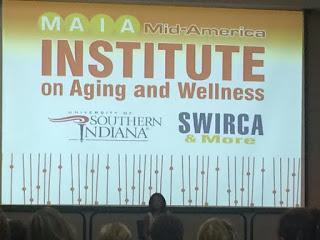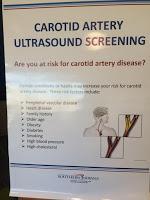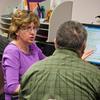
Photo by Karen D. Austin.
It's vital to connect with other professionals in your field.Attending conferences gives me the chance to observe best practices in a variety of topics related to healthy aging.
Great Resource, Great Region
Fortunately, I've moved to a region of Indiana that hosts an invigorating conference every year.
People interested in healthy aging should visit this page, Mid-America Institute on Aging and Wellness. It contains information about some of best practices in healthy lifestyle choices and helping others improve their quality of life throughout the lifespan.
This is the 9th year that the Center for Aging and Wellness at the University of Southern Indiana (USI) has hosted the conference. This summer, I moved just 15 miles from USI. The campus is on the west side of Evansville, Indiana. This city is the 3rd largest in the state of Indiana, and the hub of a Tri-State region that includes southern Illinois and western Kentucky.
USI partners with a number of other businesses and organizations. But because I recently became an employee of the university, I am a bit more focused on their role. Afterall, I was just hired the week prior to the conference. Everything is new for me: the faculty, staff, administrators, students. Even the campus buildings and parking areas are foreign to me.
Nevertheless, I jumped right in.
Sessions I Attended on Day One
Yoga with Kay Corpus, MD. She practices integrative medicine in Henderson, Kentucky, just 20 miles south of the university. Focusing on the mind-body connection was a great way to start the day. The photo above shows Dr. Corpus leading a yoga session. Not pictured are the 250 plus conference participants. It was great to join others in a shared activity.
"Food as Medicine: Preventing and Treating Disease with Diet" delivered by Michael Greger, MD. He's a general practitioner who focuses on clinical nutrition. He does a lot of work with federal government organizations and does a lot of public speaking. He was very engaging.
I would prefer to look more closely at some of the studies he glossed. Nevertheless, I do accept his main point: eating whole foods helps prevent--or at least postpone for years--various chronic diseases, such as Type 2 diabetes, heart disease, strokes, kidney failure, respiratory diseases. My daughter is a vegetarian, so I try to prepare plant-based dishes for her. My entire family can benefit from eating more plant-based, whole foods prepared closer to their natural state.
"Medical Fitness with Older Adults" presented by Donald Gallucci. He's an exercise physiologist working for St. Mary's--one of the largest providers of health care in this region. Gallucci did a great job of explaining the kinetic chain required for mobility. In other words, he explained the domino effect that happens if people have trouble with their shoulders, chest, core, hips, thighs, knees, ankles, feet--and all points in between. He used slides, audience participation, and demonstrated actions himself to encourage people to work on specific areas up and down the body to maintain (or restore) mobility.
"Spirituality and the Dementia Patient" presented by David Traxel, MPH. His decades' long work in the field of dementia care has led to an approach he and his collaborator Virginia Bell call Best Friends TM Approach. He emphasized the importance of being flexible while supporting people with dementia who are seeking spiritual connection. They may return to religious practices from their childhood, or they may enjoy participating in new practices from another religious tradition. They may even innovate their own spiritual connection by making observations about nature or the people around them. The important point is to validate what gives them spiritual meaning, even if it seems unconventional or atypical for them.
Because of my interest in supporting people with dementia and my interest in late-life spirituality, I was pleased to attend this session. I look forward to reading and reviewing some of Traxel's work. He is a leader in the field of dementia care.
Too much of a good thing?
By this point in the day, I was overwhelmed with new information, so I missed a session about substance abuse and a keynote speaker who is living with dementia. I needed time and space to process all the information I gleaned. In addition, I was meeting a lot of attendees, vendors, and conference organizers in addition to meeting presenters. Next year I will be more acclimated to the campus and the organizers. I won't be so easily overwhelmed.
Sessions I Attended on Day Two

Photo by KDA.
Free screening of my carotid artery. While technically not a session, I did start the day by receiving a free screening of my carotid artery. USI students training to be sonographers were on site. The student looked at both arteries (left and right). Her supervisor checked her work, and they interpreted the readings as "A-OK.""Discovering the Power of Advance Care Planning Conversations" delivered by Linda Briggs, MSN, MA, RN. She's an RN with further training in bioethics. She works to help people have conversations with family members and health care providers about end-of-life care. Specifically, she supports people in getting an advanced care plan in place, recognizing that this document is most effective if a result of talking. Interpreting the document and updating the document are of great importance as well. It's not just a single question to be answered during a hospital admissions process.
I have taken a course on death and dying and then taught that same course. I have also read several books and watched several documentaries on end-of-life care. Nevertheless, I learned a great deal from her presentation.
"Eat to Your Heart's Content" by Robin Mallery, RN She's an RN who worked for years in cardiac rehabilitation. After growing frustrated with disease management health care, Mallery turned her attentions toward prevention, integrated medicine, and behavior modification--all focused on the value of making healthy lifestyle choices. Through Heart Matters, she works with individuals and organizations to help people to eat locally, to eat a plant-based diet, and to prepare foods closer to their natural state.
"Retirement: Now What?" by Phyllis Bussing, PhD
"Introduction to Mindfulness" by Koren Ganas, PsyD HSPP

